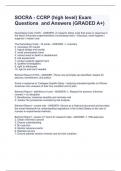SOCRA - CCRP (high level) Exam
Questions and Answers (GRADED A+)
Nuremberg Code (1947) - ANSWER -A research ethics code that arose in response to
the Nazis' inhumane experimentation (nuremberg trials) - holocaust, racial hygiene /
eugenics / master race.
The Nuremberg Code - 10 points - ANSWER -1. voluntary
2. necessary for results
3. logical design and results
4. avoid unnecessary harm
5. cannot result in death or disablement
6. risk assessment
7. protect subjects against harm
8. qualified investigators
9. right to withdrawal
10. right to end trial if needed
Belmont Report (1979) - ANSWER -Three core principles are identified: respect for
persons, beneficence, and justice.
Arose in response to Tuskegee Syphilis Study - studying untreated syphilis on African-
American men unaware of their true condition and tx plan.
Belmont Report - definitions of core - ANSWER -1. Respect for persons: informed
consent + no deception
2. Beneficence: maximize benefits and minimize risk
3: Justice: fair procedures considering risk analysis.
Belmont Report - current role - ANSWER -Serves as a historical document and provides
the moral framework for understanding regulations in the United States on the use of
humans in experimental methods.
Belmont Report - review of 7 items for research trials - ANSWER -1. IRB approved
2. Obtain informed consent
3. Ensure understanding
4. No coercion
5. Monitor adverse events
6. Maintain privacy
7. Ensure patients receive minimal care for their condition
,Declaration of Helsinki (1964, 1975) - ANSWER -Set of ethical principles regarding
human experimentation developed for the medical community by the World Medical
Association (WMA)
Good Clinical Practice (GCP) - ANSWER -ICH-GCP and ISO-GCP (medical device)
enforces guidelines on ethical aspects of a clinical trial.
Covers human rights, standards on trial conduct, roles and responsibilities (IRB, PI,
sponsor, monitors).
GCP v Declaration of Helinski - ANSWER -GCP lacks moral principles and guidance
surrounding COI, study design, benefits, result reporting.
Also restricts placebo in control group v effective alternative tx
Common Rule - ANSWER -US federal policy that specifies ethics regulations for human
subjects research
1. ICF in reasonable language, reasons why they would not want to participate in
research
2. Disclosure of use of de-identified data / specimens for future studies, commercial
profit, clinically relevant results disclosed, genome sequencing
3. Consent waiver only if research could not be carried out without accessing / using
information / specimens in an identifiable format. Pre-screening for trial permitted if able
to obtain oral or written communication OR access records / stored biospecimens.
4. Exempt / Limited IRB if
- record review both retrospectively AND propectively
- benign behavioral interactions
- collect identifiable sensitive data via adults in surveys/interviews
5. Continuing review - not required if expedited level
6. Multi-instituitional research studies required to use 1 IRB (effective 01-19-2020)
Title 21 US Code of Federal Regulations (11, 50, 56, 312, 812) - ANSWER -Title 21 is
part of the code of federal regulations governing good and drugs for the FDA, DEA, and
ONDCP (office of national drug control policy)
11 - e-records + e-signatures
50 - protection human subjects
56 - IRB that oversee trials
312 - drug trial requirements
812 - controlled substances
,Title 21 CFR Part 11 - ANSWER -1. Controls - audits, validators, audit trails, e-sigs,
documentation for software + systems processing e-data.
2. E-records cannot be illegible, inaccessible, or corrupted
3. "Hard copies" are authoritative documents for regulatory purposes
Title 21 CFR Part 50 - ANSWER -
The National Research Act of 1974 - ANSWER -Established the National Commission.
Issued in 1974, 45 CFR 46 raised to regulatory status: - ANSWER -US Public Health
Service Policy
Henry K. Beecher Article (1966) - ANSWER -Detailed 22 published medical studies
presenting risk to subjects without their knowledge or approval.
Beecher's article clearly demonstrated that unethical research was not confined to Nazi
atrocities.
U.S. Public Health Service (PHS) Study of Untreated Syphilis / Tuskegee Syphilis Study
(1932-1972) - ANSWER -Examined the natural course of untreated syphilis in Black
American men.
All were impoverished sharecroppers from Macon County, Alabama, were unknowing
subjects in the study; they were not told that they had syphilis, nor were they offered
effective treatment when it became available in the late 1940s with the availability of
penicillin.
Willowbrook studies (1956-1970) - ANSWER -Children with intellectual disabilities were
deliberately infected with the hepatitis virus
Jewish Chronic Disease Hospital study (1963) - ANSWER -Live cancer cells were
injected into 22 cognitively impaired patients.
National Research Act (1974) - ANSWER -Congress passed this act in response to the
concern on prior studies (PHS Syphilis, prisoner research, willowbrook etc)
- est. National Commission to identify basic ethical principles + guidelines
- required IRBs at organizations receiving funding
The National Commission (1975-1978) - ANSWER -Created recommendations for
regulating human subject research - vulnerable populations, psychosurgery, IRBs, etc.
, Final report published 1979 - Ethical Principles and Guidelines for the Protection of
Human Subjects of Research
-> Belmont Report
The Belmont Report - ANSWER -Based on National Commission deliberations.
1. Respect for Persons
2. Beneficence
3. Justice
Analytical framework guiding the resolution of problems arising from human subject
research.
Belmont: Respect for Persons - ANSWER -Subjects are autonomous agents - informed
consent
If diminished autonomy, need additional protection.
- Condition (age, health, cognition)
- Circumstances (poverty, lack of education, social status)
Also respect person's right to privacy (not directly addressed in Belmont).
Belmont: Beneficence - ANSWER -Strive to do no harm while maximizing benefits +
minimizing harm.
Systematic Assessment - account for probability and magnitude of potential harm
Benefit - to individual or advancement of scientific knowledge
Minimize risk - risks in research should be the minimum to achieve the research
objective. Researchers + IRBs should carefully consider alternative, less risky
procedures / modifications to reduced magnitude or probability of harm.
Belmont: Justice - ANSWER -Injustice is when benefit is denied from a person without
good reason, and some the burden is imposed unduly.
Example: research on prisoners or institutionalized children - both will not see the
benefit and must bear the burden.
Subject selection - are some selected due to availability, compromised position, or
manipulatability? Must be based on scientific need, not convenience.
Do not exclude so they do not derive benefit (i.e. not speaking english). Undue
influences from real or perceived pressures - financial, power, implied benefits.





